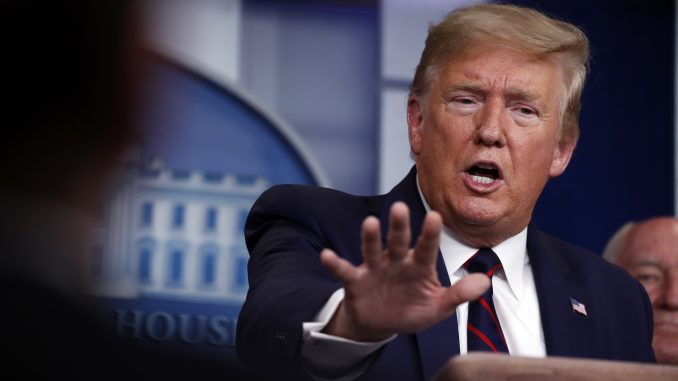
DETROIT — President Donald Trump issued an order Friday that seeks to force General Motors to produce ventilators for coronavirus patients under the Defense Production Act.
Trump said negotiations with General Motors had been productive, “but our fight against the virus is too urgent to allow the give-and-take of the contracting process to continue to run its normal course.”
Trump, who had previously been reluctant to use the act to force businesses to contribute to the coronavirus fight, said “GM was wasting time” and that his actions will help ensure the quick production of ventilators that will save American lives.
GM is among the farthest along of U.S. companies trying to repurpose factories to build ventilators. It is working with Ventec Life Systems, a small Seattle-area ventilator maker, to increase the company’s production and GM will use its auto electronics plant in Kokomo, Indiana to make the machines.
U.S. hospitals now have about 65,000 ventilators fully capable of treating severe coronavirus patients. They could cobble together about 170,000, including some simpler versions that won’t work in all cases, said Dr. Lewis Rubinson, chief medical officer at Morristown Medical Center in New Jersey and lead author of a 2010 medical journal article on the matter.
Some 960,000 people in the U.S. will need to be on ventilators at one point or another during the crisis, according to an estimate made in February by Dr. James Lawler, an associate professor and infectious disease specialist at the University of Nebraska Medical Center.
Rubinson said it’s unlikely the U.S. would need that many ventilators at the same time, estimating it will need more like 300,000. If social distancing works, people will get sick at different times, allowing hospitals to use ventilators on multiple patients.
In the most severe cases, the coronavirus damages healthy tissue in the lungs, making it hard for them to deliver oxygen to the blood. Pneumonia can develop, along with a more severe and potentially deadly condition called acute respiratory distress syndrome, which can damage other organs.
GM said Friday it could build 10,000 ventilators per month starting in April with potential to make even more. After Trump invoked the act, GM said in a statement that it has been working around the clock for more than a week with Ventec and parts suppliers to build more ventilators. The company said its commitment to build Ventec’s ventilators “has never wavered.”
Trump said from the Oval Office Friday afternoon that the government thought it had a deal for 40,000 ventilators but GM cut the number to 6,000 and talked about a higher price than previously discussed. “We didn’t want to play games with them,” he said later that evening during his daily briefing, adding that GM now agrees with him and he may be able to end the enforcement of the act.
Trump also said wasn’t happy with GM for closing its factory in Lordstown, Ohio. “I didn’t go into it with a very favorable view,” he said.
Peter Navarro, White House trade adviser, said officials worked with more than 10 companies to get ventilators, including Ford and General Electric, and nearly all have been cooperative. But the government had problems with GM and Ventec, he said. “We cannot afford to lose a single day,” he said.
GM asserts that it is offering resources to Ventec “at cost.” Ventec, not GM, is talking with the government, and the only changes Ventec has made have been at the government’s request, said Chris Brooks, the company’s chief strategy officer. GM would merely be a contract manufacturer for Ventec, he said.
Ventec ventilators, which are portable and can handle intensive care patients, cost about $18,000 each, Brooks said. That’s much cheaper than the more sophisticated ventilators used by hospitals that can cost up to $50,000, he said.
The Federal Emergency Management Agency has made multiple requests since Sunday for estimates of how many ventilators it can build at what price, and has not settled on any numbers, according to Brooks. That could slow Ventec’s efforts to ramp up production because it doesn’t know how many breathing machines it must build, he said.
Trump invoked the Defense Production Act soon after a series of tweets earlier Friday criticizing GM and CEO Mary Barra. The president also cajoled Ford to build ventilators fast. Ford responded that it’s “pulling out all the stops.”
When Trump was asked during Friday’s briefing why he invoked the act if the ventilators won’t be needed, he said he thought there is a good chance there’ll be enough and that if there ends up being a surplus, the ventilators could be sent to other countries.



